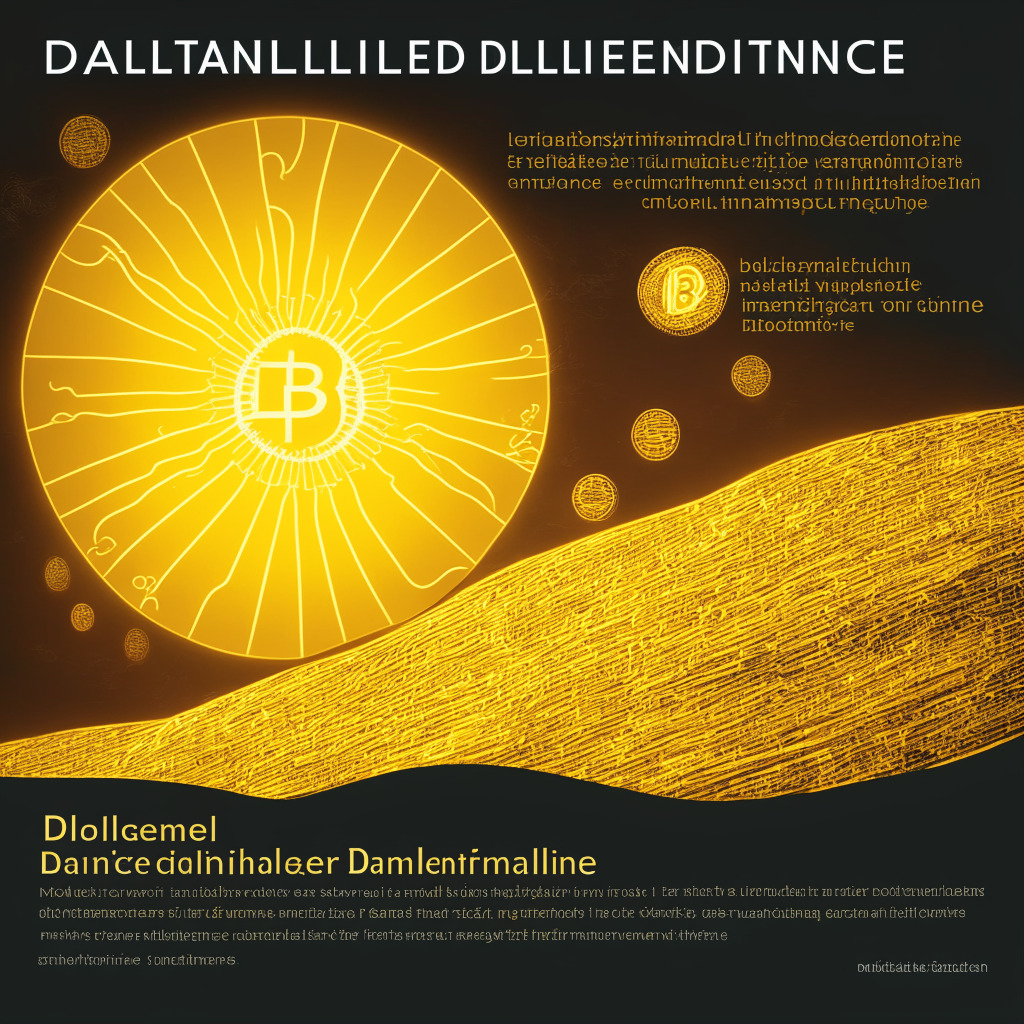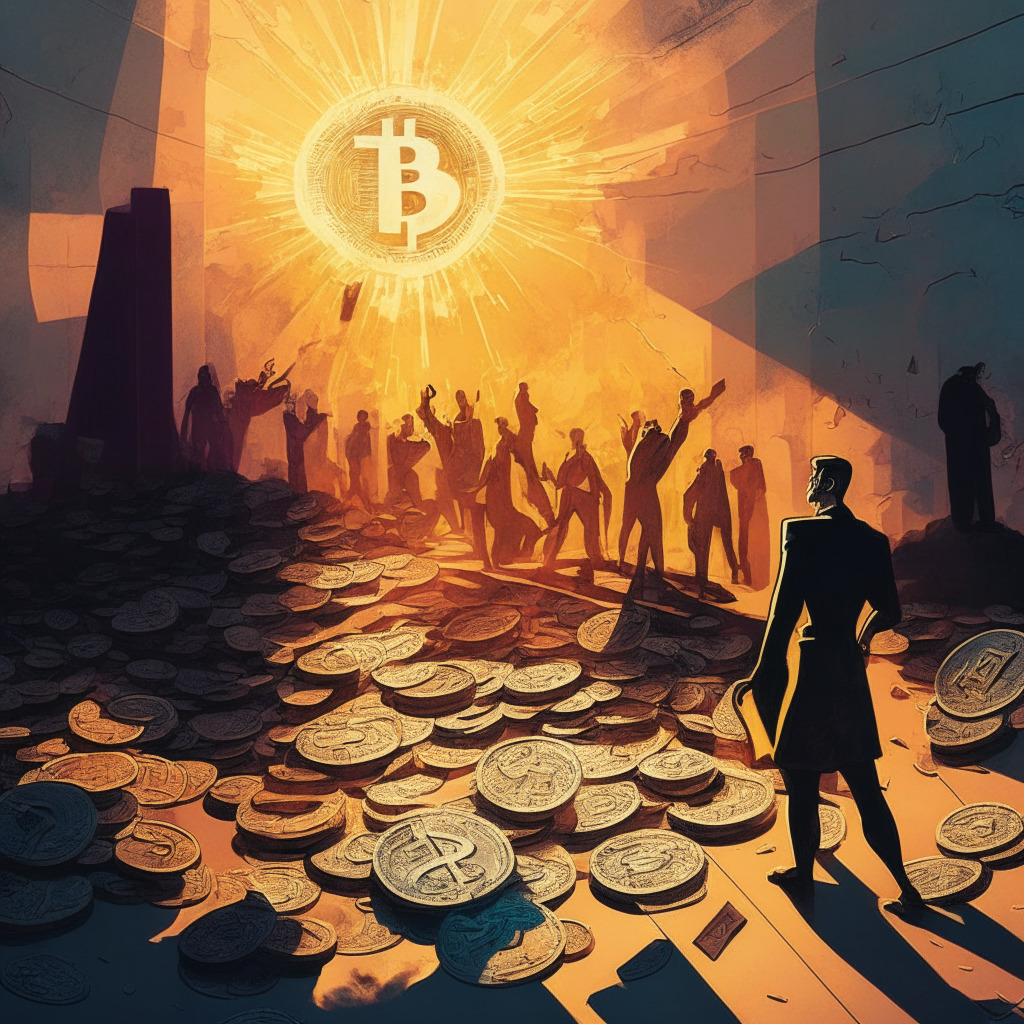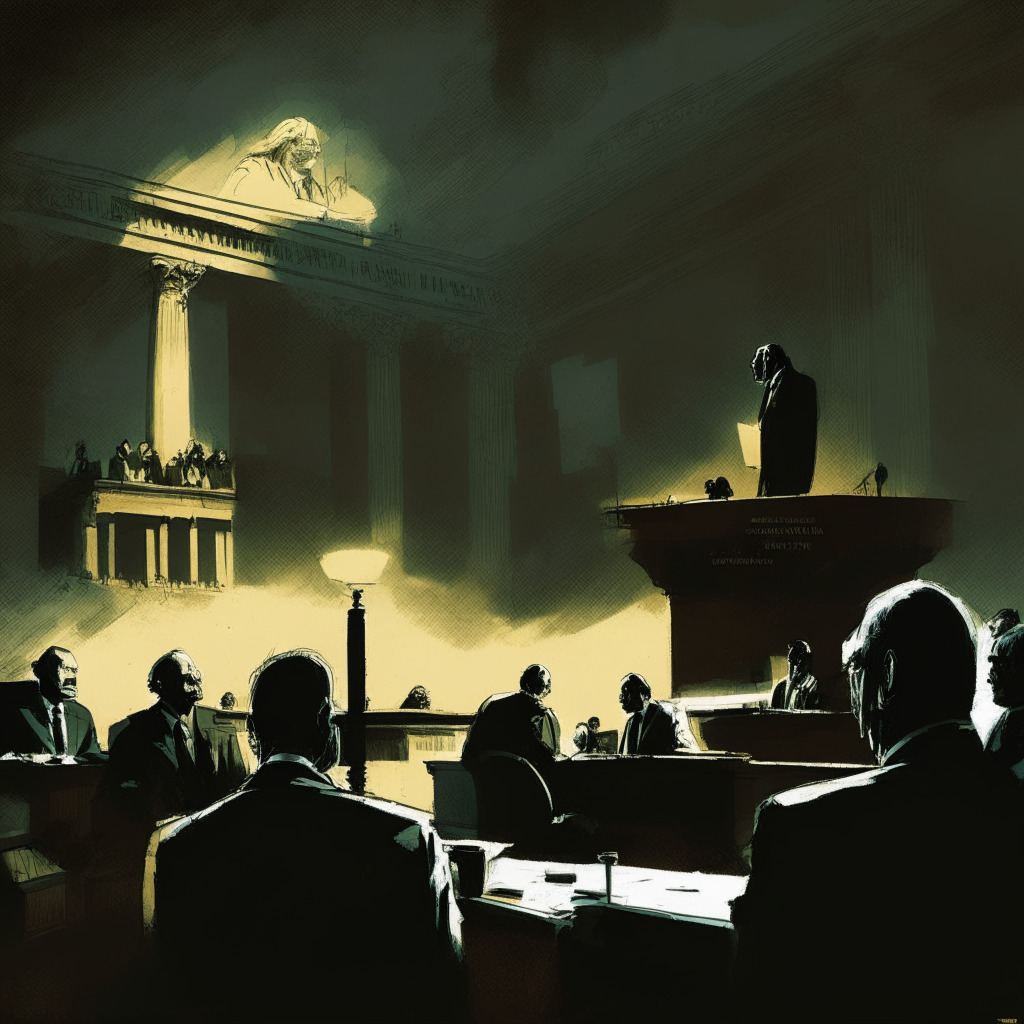An SEC filing reveals Binance allegedly moved billions in customer funds through Signature Bank and Silvergate Bank, with billions of dollars paid to Paxos Trust Company. Binance denies mixing client funds with corporate funds and claims the funds involved USD to BUSD conversions within customers’ accounts.
Search Results for: Signature
Binance Saga: Regulatory Clarity vs Crypto Innovation – Striking the Right Balance
The US SEC has accused Binance, CEO Changpeng Zhao, and related entities of moving large amounts of money, raising questions about crypto regulation. As the government grapples with complex crypto and blockchain technology, the Binance case may set a precedent for future regulatory action.
The Wild Curatorial Board: Shaping Experiential Art’s Future or Fueling Saturation Debate
Digital art collective Wildxyz has introduced The Wild Curatorial Board to advise its artist residency program, offering mentorship and shaping the future of experiential art. The board features ten accomplished artists with expertise across various digital art forms, including generative and AI-based art. They will select outstanding collections to be awarded Wild Signature status, recognizing achievements and marking innovation in the spatial internet era.
Binance-SEC Lawsuit: $70 Billion Moved Through Bankrupt Banks – Regulation & Transparency Debate
A Bloomberg report reveals that Binance and its affiliates moved $70 billion through Silvergate Bank and Signature Bank, raising concerns about funds movement transparency and banks’ role in the crypto industry. The SEC’s case against Binance alleges mishandling of client funds, while the exchange claims the transfers were part of regular business operations.
Senator Warren’s Anti-Crypto Agenda: How KYC & AML Challenges Can Make or Break Blockchain
The “anti-crypto army” led by US Senator Elizabeth Warren has intensified scrutiny on the blockchain industry, citing concerns over financial crime and national security. The crypto community fears that a broad regulatory approach may hinder the industry’s growth and undermine decentralization aspects of Web3.
Creating the Ultimate Crypto-Friendly Bank: Overcoming Challenges and Seizing Opportunities
Santiago R. Santos recently proposed building a new “crypto-friendly bank” to fill the void left by the collapses of major crypto-friendly banks. Despite challenges, Santos envisions assembling a team, guided by his experience from the crypto and traditional finance worlds, to create a bank servicing individuals, businesses, and institutions in the ever-growing crypto industry.
Risky Payment Apps vs Secure Bitcoin: Navigating FDIC Protection & Financial Security
The Consumer Financial Protection Bureau (CFPB) warns that funds stored in popular payment apps may not be insured, highlighting possible financial uncertainties. Bitcoin, with its decentralized nature and self-sovereignty, gains attention as a secure alternative providing users sole ownership and control over their funds, unlike payment apps.
Stablecoins: A Solution to Crypto’s Banking Crisis Amid Operation Chokepoint 2.0
Stablecoins may counter the impact of Operation Chokepoint on the crypto sector, providing a solution to the US banking crisis facing crypto companies. Leveraging stablecoins can minimize bank dependency and establish an autonomous parallel financial system, despite potential risks and regulatory challenges.
CFTC Risk Management Review: Analyzing Crypto’s Impact on Swap Dealers and Futures Markets
The US CFTC is scrutinizing risk management regulations, particularly in the digital asset sector. CFTC Commissioner Christy Goldsmith Romero identified cryptocurrencies as a potential risk, citing unregulated spot markets, operational challenges, and prevalence of fraud. She emphasized reevaluating regulatory oversight for digital assets, artificial intelligence, and cloud services.
P2P Payment Apps: Uncovering Hidden Risks and the Importance of FDIC Coverage
The US Consumer Financial Protection Bureau warns that funds stored in nonbank payment platforms, including those offering crypto services, may not be protected by federal deposit insurance coverage. With recent collapses involving major banks, consumers must exercise caution and understand potential risks when managing assets through online payment services.
Tron’s Multisig Vulnerability: Assessing the Network’s Security and $500 Million at Stake
A critical zero-day vulnerability in the Tron network’s multisignature mechanism was discovered by dWallet Labs, affecting over $500 million worth of digital assets. The flaw, which allows unauthorized transactions, raises questions about Tron’s reliability and security, but the prompt patch deployment is a positive sign.
Texas Bitcoin Mining Boom: Supportive Legislation and State-Level Tug of War
Texas embraces bitcoin mining as legislators pass supportive bills, SB 1929 and HB 591, solidifying the state’s position as a premier destination for the industry. However, future federal-level regulation remains uncertain, with individual states currently leading policy development.
Bank Collapse: A Cautionary Tale of Crypto-Fear and Public Education
Barney Frank blamed industry outsiders for Signature Bank’s collapse, arguing their crypto dealings were “safe and sound” prior to regulators stepping in. Public confusion and “crypto-fear inaccurate withdrawals” contributed to the institution’s failure, highlighting the importance of educating the public to avoid future crises in the crypto industry.
Debt Ceiling Negotiations and Cryptocurrency: Seeking the Perfect Balance
The House of Representatives votes on postponing the debt ceiling until 2025 through the Fiscal Responsibility Act of 2023. This bipartisan agreement will impose limits on discretionary spending, but its impact on growth, innovation and the cryptocurrency sector requires a delicate balance between fiscal responsibility and flexibility.
Crypto Bills in Limbo: Texas Legislature’s Inaction and Its Impact on the Industry
Texas’ regular legislative session closed, leaving cryptocurrency bills unresolved for potentially 19 months. One notable bill, Texas Senate Bill 1751, aimed to eliminate tax breaks for miners and impose stricter energy usage control. Another bill, House Bill 1666, seeks to mandate cryptocurrency exchanges to hold adequate reserves for customer obligations.
Tron Multisig Vulnerability Exposed: A Lesson in Blockchain Security and Vigilance
A zero-day vulnerability in Tron multisig accounts, discovered by dWallet Labs, risked $500 million worth of assets by potentially bypassing the multi-signature mechanism. The vulnerability was resolved in February, emphasizing the importance of continuous security assessments and improvements in the blockchain space.
Texas Crypto Regulations: Unresolved Bills, Mining Rivalry, and Governor Abbott’s Choices
Texas lawmakers leave crucial crypto regulation bills unresolved. Senate Bill 1751, restricting cryptocurrency mining firms, is now unlikely to be addressed until 2025. However, House Bill 1666 and House Bill 591, await Governor Greg Abbott’s action, potentially shaping Texas’ approach towards digital assets for years to come.
Cardano’s Exciting Developments: Network Fixes, dApps, and Market Impact Explained
Cardano tackles key projects including network issues, decentralized exchange swaps, and dApps, leading to a 1% increase in ADA value. With improvements in nodes, networking, and ledger, the network’s performance sees a considerable boost, positively impacting the overall price of ADA.
Balancing Blockchain Future: AI Advancements, Regulations, and Risks in Focus
Microsoft President Brad Smith urges lawmakers and companies to establish regulations and risk management strategies for AI development, emphasizing the importance of corporate involvement and proposing “safety brakes” for AI systems controlling critical infrastructure.
South Korea’s Crypto Disclosure Law for Politicians: Progressive Move or Stifling Innovation?
South Korea’s National Assembly unanimously passed a bill requiring lawmakers to declare their cryptocurrency holdings. This progressive stance on digital assets promotes transparency, potentially reducing insider trading risks but may hinder innovation in the growing crypto market. The ongoing challenge is balancing regulatory oversight and innovation promotion.
Cross-Chain NFT Purchases Made Easy: NFTrade Partners with Rarimo for Seamless Transactions
NFTrade, an NFT marketplace, has introduced cross-chain purchases and payments on Ethereum, BNB Chain, Polygon, and Avalanche via partnership with Rarimo. This enables users to initiate a purchase on one network and pay on another seamlessly, improving the Web3 user experience.
US Banking Crisis: Crypto Downturn & Big Returns for Risk-Takers, Weighing Pros & Cons
The recent US regional banking crisis highlights the disparity between major Wall Street banks and smaller institutions, affecting US banking stocks. Investor Michael Burry purchased shares in beleaguered banks, and amidst market uncertainty, the crypto market experiences a downturn.
Mordinals: NFTs on Monero Blockchain – Risks, Privacy Concerns & Future Prospects
The rise of Mordinals, nonfungible tokens (NFTs) on the Monero blockchain, has sparked concerns within the Monero community about potential risks to privacy, decentralization, and illegal usage. Despite these concerns, proper interventions and approaches can maintain user privacy while allowing NFTs to thrive on Monero without compromising its core principles.
Visa Tackles Ethereum Account Abstraction & ERC-4337: Revolutionizing Crypto Payments
Visa explores Ethereum Account Abstraction and ERC-4337 for secure automatic recurring payments and potential gas fee redesigns. This aims to improve user convenience and enable seamless digital transactions in crypto onboarding experiences. Ethereum co-founder, Vitalik Buterin, supports these innovations for self-custodial wallets.
Failed Banks Blame Crypto: Is it Deflection or Legitimate Concern?
US Senators criticize executives of failed banks for deflecting responsibility for poor management onto digital asset firms. Senator Lummis highlights divergence in perspectives on digital assets’ role in recent bank failures. Transparency and accountability in banks dealing with digital assets are essential in building trust and adapting to the rapidly changing landscape.
CoinShares Bounces Back: Analyzing Q1 2023 Earnings amidst Crypto Turbulence
CoinShares’ Q1 2023 earnings report reveals a return to profitability, generating £15.3 million in revenue and showcasing the firm’s resilience in a complex financial landscape. Factors affecting earnings include collapsed crypto-friendly banks and regulatory scrutiny, but the company remains cautiously optimistic for the future.
Bank Failures: Are Digital Assets the Culprits or Scapegoats? Debating Responsibility and Regulations
This excerpt raises questions about the impact of digital assets on traditional banking institutions and whether it’s fair to blame cryptocurrencies for bank failures. It emphasizes the importance of collaboration between stakeholders, regulators, and the banking sector to ensure a well-regulated environment fostering growth and stability in both traditional banking and cryptography sectors.
Banking Crisis Fears Boost Crypto Markets: Balancing Innovation and Financial Security
Amid the potential US regional banking crisis, the uncertainty in the banking sector has proven to be bullish for Bitcoin prices. The rise of cryptocurrencies and decentralized finance offers potential solutions to traditional banking challenges during times of economic uncertainty while also prompting concerns and striking a balance between innovation and security.
FDIC Blames Crypto for Bank Collapses: Analyzing Risk Factors and Future Implications
The FDIC chair, Martin Gruenberg, attributes non-compliance with risk controls, poor governance, and dependence on uninsured crypto deposits to the collapse of crypto-friendly banks like Signature Bank and Silicon Valley Bank. While cryptocurrencies played a part, sound governance and responsible investments are essential for financial stability.
Anchorage Digital Enhances Crypto Governance with Snapshot Voting: Pros, Cons & Conflicts
Anchorage Digital integrates Snapshot voting for custody customers, aiming to improve participation in crypto governance. Supporting over 60 ERC-20 tokens, the off-chain platform eliminates interoperability issues and streamlines protocol interactions. Snapshot’s gasless voting feature enhances accessibility, reflecting the growing importance of efficient crypto governance mechanisms.
Crypto Bank Runs: The Role of Whales and Risky Investments in Market Turmoil
A recent study found that the 2022 crypto bank runs were majorly triggered by whale account holders withdrawing large portions of their funds. Crypto platforms’ run risks arose from allowing unrestricted withdrawals while using funds for risky, illiquid investments, highlighting policy concerns.
Crypto Bank Closures: Striking a Balance Between Regulation and Innovation
Signature Bank reduced digital asset deposits due to increased volatility and regulatory concerns, according to former chairman Scott Shay. The collapse of three crypto-focused banks in March impacted the crypto industry, raising questions on whether regulatory intervention and banks’ decisions are necessary for financial stability or inadvertently stifle the growth of the crypto and blockchain industry.































